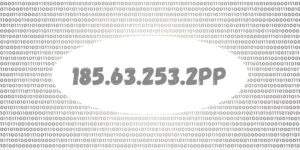The internet has become a critical part of daily life, with each device connecting through IP addresses to ensure data is correctly transmitted across the network. One such address that has come under the spotlight in recent years is “185.63.253.2pp.” Though it may seem like an unusual format, this address plays a role in online networking, particularly in terms of security, virtual private networks (VPNs), and communication channels. It is essential to understand the structure and usage of such an IP address to comprehend its impact on digital activities.
In this article, we will explore what 185.63.253.2pp means, how it operates, and its applications in different sectors. From its possible connection to cyber threats to its role in data routing, this IP address holds significance in the realm of internet infrastructure. To better grasp its impact, we will analyze its key characteristics, associated technologies, and potential security risks tied to such addresses, helping you understand both its functionality and potential hazards in the digital ecosystem.
What Is 185.63.253.2pp?
An IP address is essentially a unique identifier assigned to each device that connects to the internet, ensuring data packets reach the correct destination. In this case, “185.63.253.2pp” refers to a specific address that appears to have an extra character, namely the “pp” suffix. Generally, IP addresses are presented in numerical format separated by periods (IPv4), such as 185.63.253.2. However, the “pp” suffix could imply a typographical error, a misconfiguration, or an intentional alteration of the standard address format used by certain networks or systems. It is also possible that “pp” might refer to a specific protocol or extension applied to the base address, such as a private network or proxy setup.
Given the prevalence of internet security and privacy concerns, some internet users rely on techniques like IP masking, VPNs, and proxies to obscure their true IP addresses. The “pp” suffix could be part of a network obfuscation strategy, which helps users navigate websites securely or hide their digital footprints. This notion becomes more relevant when considering the potential applications of such an address in different systems.
How IP Addresses Function in Networking
To understand the importance of IP addresses like 185.63.253.2pp, it is crucial to first understand their general role in networking. Every device on the internet needs a unique address to communicate with other devices. These IP addresses facilitate the routing of information across the network, ensuring that messages, files, and requests are sent to the correct device. The two most common versions of IP addresses are IPv4 and IPv6.
IPv4, which is commonly used in networking today, uses a 32-bit address system, allowing for over 4 billion unique addresses. This address format is expressed as four sets of decimal numbers, each ranging from 0 to 255, separated by periods (e.g., 185.63.253.2). IPv6, on the other hand, uses a 128-bit system, which accommodates a much larger address space. The unique addresses are critical to enabling data transfer, online activities, and global communication. Without these IP addresses, the internet as we know it would not be functional.
The Role of VPNs and Proxies
Virtual Private Networks (VPNs) and proxies are popular tools for internet security and privacy. A VPN creates a secure connection between a user’s device and the internet, effectively masking the user’s original IP address. This process can allow users to browse the internet anonymously, bypass geographic restrictions, and access content from different regions. Proxies, like VPNs, act as intermediaries between a user and the internet, routing requests through a different IP address to conceal the user’s original identity.
The 185.63.253.2pp address could potentially be associated with a VPN or proxy server, providing users with enhanced privacy or the ability to circumvent content restrictions. These servers alter the visible IP address of a user, making it appear as if the connection originates from a different location. This could explain the unusual “pp” suffix, which might represent a specific configuration or routing mechanism used by a VPN or proxy service.
Security Implications and Risks of Altered IP Addresses
While VPNs and proxies offer significant benefits, such as enhanced security and privacy, they also introduce potential risks. Cybercriminals and hackers often exploit the anonymity provided by these services to carry out illicit activities. The use of proxies and VPNs can make it more difficult for authorities to trace malicious actions back to the perpetrators, complicating investigations into cybercrimes.
Additionally, altered or obscure IP addresses like 185.63.253.2pp could be an indication of suspicious activity, particularly if they are associated with unknown or untrustworthy sources. If such addresses are found in connection with phishing attempts, malware delivery, or other cyberattacks, it could raise red flags regarding the integrity of the networks involved. Therefore, individuals and organizations need to carefully assess the IP addresses they encounter and ensure they are dealing with legitimate, trusted entities.
Analyzing the “pp” Suffix
The “pp” suffix at the end of 185.63.253.2pp could be more than just a typo or formatting error. In some cases, the “pp” may represent a specific protocol, platform, or feature associated with the IP address. One possibility is that “pp” stands for “Private Protocol,” indicating that the address is part of a private network or a closed system. This could be relevant for users or organizations that require an isolated network for secure communication or data transfer, as private IP addresses are typically used in internal networks.
Alternatively, the “pp” could refer to a proxy or point-to-point protocol used to establish connections between two devices over a network. This type of protocol allows devices to communicate securely across the internet, often used in VPNs and encrypted communication channels. If this is the case, it would imply that 185.63.253.2pp is involved in a specific form of communication or encryption.

The Relationship Between IP Addresses and Online Threats
IP addresses are closely linked to various types of online threats, including denial-of-service (DoS) attacks, distributed denial-of-service (DDoS) attacks, and malware propagation. Malicious actors often rely on a variety of IP addresses to mask their true location and distribute their harmful activities across multiple networks. These attackers can leverage proxies, VPNs, and other anonymizing tools to hide their identity and make it more difficult for security teams to pinpoint their source.
Moreover, hackers may use fake or altered IP addresses, like 185.63.253.2pp, to trick users into believing they are dealing with a legitimate entity. For instance, a hacker might use a compromised VPN server to mask their IP address while carrying out an attack. In such cases, the “pp” suffix could be a deliberate attempt to confuse security systems or create an impression of legitimacy.
More Read: Xlecz
How to Safeguard Against IP-Based Attacks
Given the risks posed by altered IP addresses and the potential for online threats, it is essential to implement robust security measures to safeguard personal and organizational data. One of the most effective ways to protect against IP-based attacks is to use reliable security software, firewalls, and intrusion detection systems. These tools can help identify and block suspicious IP addresses, preventing unauthorized access and malicious activities.
Additionally, organizations should monitor network traffic for unusual patterns or behaviors associated with specific IP addresses, particularly if they exhibit signs of manipulation or obfuscation. Using tools like reverse DNS lookups and IP address geolocation services can help identify potentially dangerous addresses and assist in thwarting attacks before they escalate.
Conclusion
In conclusion, understanding the significance of IP addresses like 185.63.253.2pp is crucial in navigating the complexities of modern internet security. Whether these addresses are linked to proxies, VPNs, or other network technologies, they represent a critical aspect of digital communication. By recognizing the potential risks and applications of such addresses, users and organizations can take proactive steps to enhance their online safety and privacy. As the internet continues to evolve, staying informed about emerging threats and technologies will be vital in ensuring a secure and efficient online experience. Whether you are a casual internet user or a network administrator, understanding how to interpret and respond to these addresses can make a significant difference in protecting sensitive data from malicious actors and cyber threats.
FAQs:
What does the “pp” suffix in 185.63.253.2pp mean?
The “pp” suffix could indicate a proxy server, private protocol, or an error in the IP address format. It may refer to specific configurations used in virtual private networks or secure communication channels.
Is 185.63.253.2pp associated with any known security risks?
While it’s impossible to know definitively, the “pp” suffix could be associated with VPNs or proxies, which are often used for both legitimate privacy purposes and malicious activities. It’s important to monitor IP addresses for suspicious activity.
Can IP addresses like 185.63.253.2pp be traced back to cybercriminals?
Yes, if associated with cybercrime, IP addresses can be traced using reverse DNS lookups or IP geolocation tools. However, anonymity tools like VPNs and proxies can complicate the process.
Visit for more, Truswiki











